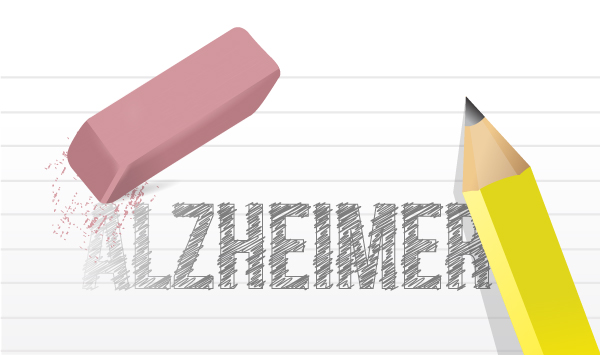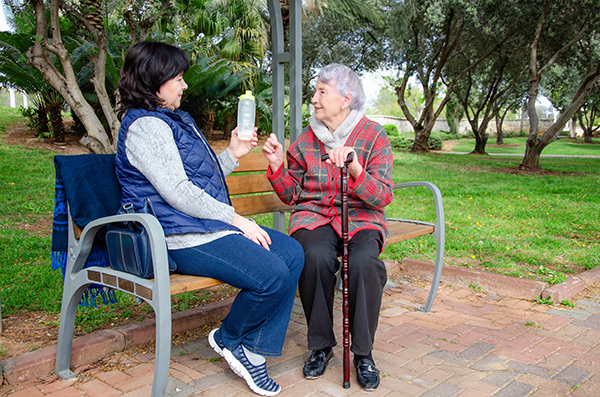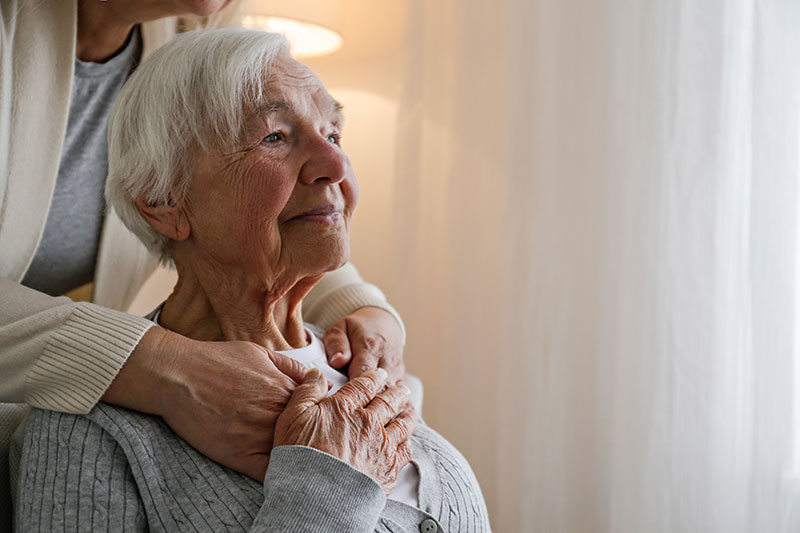Senior Medical Care
How to Tell if It’s Delirium or Dementia
Learn whether a senior may be experiencing delirium or dementia, and how you can help.
Although dementia takes center stage in diagnoses for older individuals who are struggling with confusion, memory lapses, and disorientation, there’s another condition that is also common, producing similar symptoms, and most importantly, can be cured: delirium. In fact, as many as ¾ of older adults experience delirium after a surgical procedure or infection, and proper diagnosis is crucial to ensure proper treatment. So how can you tell if it’s delirium or dementia impacting someone you love?
One of the biggest differentiators in delirium is that it arises quite suddenly. It also has a tendency to cause symptoms that come and go throughout the day, as opposed to dementia’s slow, steady, ongoing, and rather predictable progression. For example, a person with delirium may struggle … Read More »
4 Important Facts About Cancer You May Not Know
These facts about cancer may change the way you think about the disease.
Each year since 1999, we’ve achieved an increasing decline in cancer-related deaths, an encouraging trend that’s poised to continue as researchers learn more and more facts about cancer and its causes, and are able to develop new and better treatment methods. Yet cancer is still one of the leading causes of death in America, second only to heart disease – making it all the more crucial to continue to press forward with persistence to find a cure.
Here’s what we’ve learned so far:
Diet makes a difference. Although a diet rich in antioxidants can help prevent cell damage (and protect against cancer), a recent study showed that in some cases, cancers take advantage of a nutrient-rich diet, leading to accelerated metastasis. As a result, the recommendation … Read More »
Women and Alzheimer’s: Why the Risk Is So Much Greater and How to Help
Understand the trend between women and Alzheimer’s and discover how you can help someone you love who is battling the disease.
Researchers are finally beginning to get a grip on the imbalance between Alzheimer’s diagnoses in women and men. Currently, as many as 2/3 of those with Alzheimer’s in the U.S. are female. As scientists begin to understand the particular nuances behind the increasing trend of women and Alzheimer’s, we can begin to address the problem and find solutions.
According to the Alzheimer’s Association’s Director of Scientific Engagement, Rebecca Edelmayer, “Women are at the epicenter of Alzheimer’s disease as both persons living with the disease and as caregivers of those with dementia. Over the last three years, the Alzheimer’s Association has invested $3.2 million into 14 projects looking at sex differences for the disease and some of the … Read More »
Avoid These 5 Ways That Worsen the Symptoms of Alzheimer’s
It’s important to be aware of several key triggers that can worsen the symptoms of Alzheimer’s.
While there are a number of commonalities, the symptoms of Alzheimer’s can impact each individual differently. Our highly trained dementia caregivers know, for instance, that while one person may appreciate being outdoors, another may be overwhelmed by so much sensory input and prefer a quieter indoor environment. One may appreciate a morning bath routine, while a dose of resourcefulness is necessary to help a different individual maintain good hygiene.
We also realize there are certain triggers that may often worsen the challenging aspects of Alzheimer’s disease. Family care providers should be particularly careful to avoid the following:
Dehydration. Someone diagnosed with dementia might not be able to identify when they are thirsty, or may refuse when offered fluids. It’s vital to ensure appropriate … Read More »
Warning: These Common Medications May Increase Dementia Risk
Certain medications may now be linked to an increased dementia risk.
They are currently recognized to cause various short-term side-effects, for example, memory issues and confusion, but new research links some of the stronger anticholinergic drugs (like those prescribed for Parkinson’s disease, epilepsy, depression, and overactive bladder) to a markedly higher dementia risk.
The research involved two groups of seniors: 59,000 patients with dementia, and 225,000 without. Approximately 57% of those with dementia, and 51% without, were supplied a minimum of one (and up to six) potent anticholinergic medications. Considering other established dementia risk factors, the outcomes were an astounding 50% increased risk of dementia in individuals who were taking strong anticholinergics daily for three or more years, with the highest risk to people who received a dementia diagnosis before age 80.
It is critical to note that … Read More »
How to Empower Seniors to Take Control for Better Chronic Health Care
Seniors know best what they’re dealing with; empower them to take control of their chronic health care needs.
When it comes to chronic health care, seniors are the experts, hands down, with up to three out of four seniors affected by a number of conditions that are ongoing, necessitate long-term medical treatment, and place restrictions on activities. With the never-ending barrage of bloodwork as well as other tests, physicians’ appointments and procedures, and medications, managing chronic diseases usually takes both a physical and emotional toll, and may quickly become daunting.
Dr. Mary Tinetti, chief of geriatrics and internist at Yale School of Medicine, said, “Once you get three, four, or five and six diseases, several things happen: Number one, almost guaranteed, trying to get one of these diseases under control is going to make one of the other … Read More »
How Artificial Intelligence Is Playing a Key Role in Alzheimer’s Research
Learn about the tool that’s helping expedite Alzheimer’s research.
Alzheimer’s research took a giant leap forward, thanks to a tool that allows pathologists to analyze and classify amyloid plaques and abnormalities in blood vessels through technology similar to face recognition software – leading to the ability to process a vast amount of data in a markedly reduced amount of time.
The study, conducted by UC Davis and UC San Francisco, tested the ability to automate the time-intensive process of reviewing, identifying, and analyzing microscopic amyloid plaques in brain tissue. Dubbed “blob or not,” this digital pathology tool was found to be highly efficient – correctly annotating plaque samples at the unimaginable rate of 2,000 per hour – limited only by the number of processors used in the study. The program was even able to distinguish between different types … Read More »
Try These Tips to Help with Appetite During chemotherapy
Chemotherapy can affect how foods taste, but there are steps you can take to help.
Good nutrition is crucial during cancer treatment and recovery, yet not always easy to achieve. Appetite problems during chemotherapy are common, as a result of the way the treatment impacts how foods taste. Many people undergoing chemo treatment complain of a metallic aftertaste in foods, and this can even occur in plain water. When combined with another prevalent side effect of chemotherapy – nausea – sticking to a healthy diet can be a challenge.
Clinically known as dysgeusia, it’s a condition that affects as many as 65% of patients receiving chemotherapy, sometimes lasting for just a few days or even up to several months. Nutritionist Ginger Hultin, RDN, explains, “Taste changes can really turn people off to eating enough food. Patients can start … Read More »
Top Medications for Alzheimer’s and How They Work
These top medications for Alzheimer’s are key to managing the symptoms of the disease.
The latest Alzheimer’s statistics are sobering. The disease is now the 6th leading cause of death, rising above both breast cancer and prostate cancer combined. And though deaths from many other chronic conditions, like cardiovascular disease, are decreasing, those from Alzheimer’s have increased upwards of 100%. The toll the illness takes on family caregivers is likewise shocking, with more than 16 million Americans delivering over 18 billion hours of care for a senior loved one with Alzheimer’s disease.
Though we’ve yet to find an end to Alzheimer’s disease, there are two top medications for Alzheimer’s that can help minimize some of the more predominant symptoms. If your senior loved one has been diagnosed with Alzheimer’s, there are a couple of options the doctor may … Read More »
Family Caregiver Tips: How to Overcome Resistance to Care
Overcome resistance to care with these family caregiver tips from the leader in Sonoma home care services.
For many seniors, admitting the need for help is likened to admitting defeat. After living in an era that emphasized the need to pull ourselves up by our bootstraps and stay strong and self-reliant in the face of adversity, it’s a difficult mindset to change. How can you help aging parents understand the benefits of home care assistance, without viewing it as a threat to their freedom and independence?
















